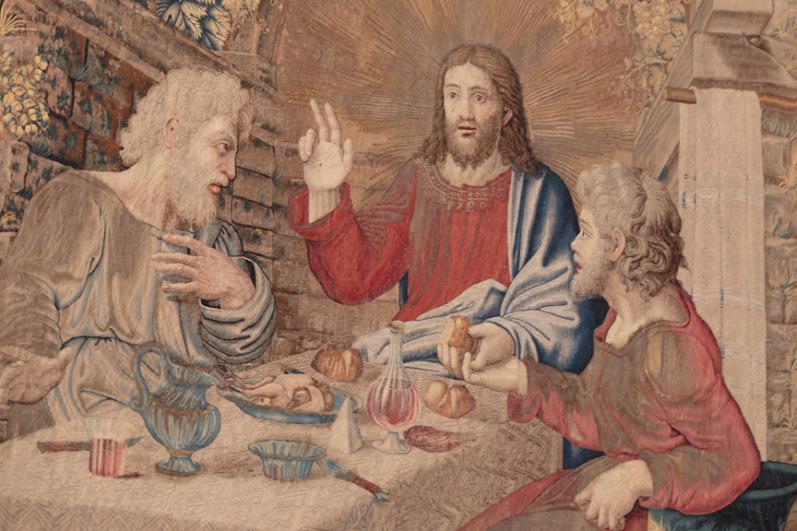Bread and Wine: What we bring to the Mass and how it changes us
The Eucharist is a great work of cooperation. We supply the matter -- the bread and wine, which is not simply natural material, but the produce of human work and culture -- that God then transforms into the Body and Blood of Christ. Bread and wine are so central to the history of human culture that they could even be more simply expressed as "food" and "drink." Although we see wine as an extraneous pleasure or something luxurious today, it was a core element of culture in the ancient world, and its cultivation, along with the domestication of grain, stands at the very beginning of civilization.
Bread represents our daily sustenance, while wine signifies something more than simple nutrition, leading to the gladness of heart spoken of by Psalm 104: "Wine to gladden the heart of man, oil to make his face shine, and bread to strengthen man's heart" (vv. 14-15). Both were used in Israelite worship, beginning with the offering of Melchizedek and continuing in the cereal offerings and libations of Israel's daily sacrifice. Even within the sanctuary of the tabernacle and temple, there was an altar of the presence (or face) where 12 loaves or cakes of bread were placed, symbolizing the presence of God's face to the 12 tribes of Israel (see Exodus 25). Israelites also ate unleavened bread during the Passover, with four cups of wine spaced throughout the ritual of the meal.
Jesus took up and fulfilled this entire tradition of bread and wine, centered especially on the Passover, during the Last Supper. Bread and wine were drawn into worship in a way beyond comprehension, becoming Christ's own Body and Blood, while maintaining the attributes of bread and wine so that we can consume Christ as food. This new "daily bread" for which we pray feeds and strengthens the soul, and the cup of salvation gladdens our heart unto eternal life. This transformed bread and wine not only affirm the history of Jewish worship; it also affirms our own work, enabling us to contribute the matter needed for this supernatural feast.
The Church has followed the Lord's command faithfully, in unbroken succession through the ages, to "do this in memory of me" (Lk 22:19). This has required that the faithful work to provide the bread and wine needed for the Eucharist. In the early Church, the faithful brought bread to the celebration, as Origen describes: "We also eat the bread presented to us. And this bread becomes by prayer a sacred body, which sanctifies those who partake of it" ("Against Celsus," 8:33). The monastic communities, however, seeking to be self-sufficient, had to grow their own wheat and cultivate the vine so that they could celebrate the sacraments. In doing so, over time, they stimulated agriculture in the surrounding community and perfected the art of vinting. The word clos, a walled vineyard, comes from the monastic enclosure of vines, where the monks, through patient observation, learned which grapes grew best in what soil, with how much sunlight and moisture. The monks perfected the fruits of the earth and drew them into divine worship.
The monastic ideal of "ora et labora" (the unity of prayer and work) points to a key spiritual principle of the Eucharist. Cult, cultivation, and culture -- or worship, work, and communal life -- are all three drawn together through the Mass. Like the Old Testament sacrifices, we bring the fruits of our work to offer them to God, with our work becoming worship. The bread and wine symbolize all of our work and life, which we bring for transformation. This offering in turn forms the very center of our communion with God and with others, giving birth to Christian community. The Eucharist is at once the central family meal of God's people that nourishes, as well as our greatest sacrifice, in which our life is joined with Christ's and his perfect honoring of the Father.
God asks us to bring something to the Eucharistic table. The bread and wine symbolize the more complete offering of our life, which is also transformed during the Mass as we become one with Jesus and are also made into his body, as members joined to the head. Jesus takes up the fruit of work and transforms it into his own offering of himself that draws us into his gift of self. In communion, our gift is given back to us, transformed so that can become what we eat, becoming one with Christ. The Eucharist changes the world by changing us. It calls forth the fruit of human work and provides the impetus to change and perfect the world ever further.
Eating the body of Christ and drinking his blood changes everything. We may bring our work to the Mass, though our worship flows back into our work. Enlivened by God's presence, we do not simply work through our own powers. God works in and through us to transform the world as we extend the communion that we have with him to the rest of our lives. The Eucharist leads us to live differently, living as a new creation. Strengthened and gladdened by eating divine food, our inner lives should overflow into our relationships and work, making them to be more than they ever could on their own. Living a Eucharistic life of prayer and work offers a witness to others, inviting them to bring their own work to the altar, to find its fulfillment in the Eucharistic sacrifice.



















